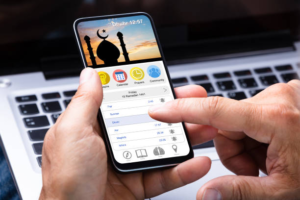5 Innovations Transforming The Landscape of Travel and Hospitality

The travel and hospitality industry, always ready for technological change, is experiencing a revolution like no other. With the advent of new technologies, this field is reshaping, improving not only workflows but also skyrocketing user experiences to heights never reached before.
From AI-led customization to green efforts, the inventions moulding this field are proof of human creativity and anticipation. Let’s explore five primary inventions reshaping the travel and hospitality world.
1. Artificial Intelligence and Personalization
AI is changing the travel and hospitality industry, providing the personal touch we never thought possible. It uses machine learning to sort heaps of data, figuring out preferences and habits to create unique services for each wanderer.
For example, AI-supported chatbots are there for you round-the-clock, managing bookings, giving you travel guidance and even sorting out problems instantly. This tech also works its magic in tailored hotel room experiences. Here, AI tweaks all—from lights to room temperature—based on guest preferences noted during earlier visits.
Moreover, AI boosts operational efficiency. It uses predictive analytics for managing stuff like inventory and personnel, and it gets better at picking the busiest travel times. This helps cut down on waste and inefficiencies. At airports, security checks powered by AI help speed things up and keep things secure. The cool thing about AI in travel is it keeps getting better– it learns from every trip to make the next one even better.
2. Virtual and Augmented Reality Experiences
Virtual Reality (VR) and Augmented Reality (AR) aren’t just ideas from the future anymore. They’re real tools changing how we travel. VR lets future travelers check out places before they book. It shows them cool previews of hotels, tours, and places to go. It helps them make choices and makes them look forward to their trips more.

AR, on the other hand, transforms real-world travel experiences. With AR devices or phones, you can know much about where you are. This can be details about an old monument or what people think of a restaurant nearby.
In museums, AR can make displays come alive and make learning fun. These technologies are not just about novelty. They add value to the trip and make every journey unforgettable.
3. Sustainable Practices and Eco-Friendly Innovations
More people worry about sustainability these days, and travel industries are stepping up. They’re making things more eco-friendly. Hotels have started using renewable energy, recycling water, and producing less waste.
Biodegradable toiletries and linen programs that reduce water and energy usage are becoming standard. Not only does this help the environment, but it’s also good for travelers who like to think green.

Sustainability is being pushed in travel hotspots via measures like conservation and community-based tourism. They work to protect both the environment and cultural sites, which makes vacationing more mindful. Actions such as counterbalancing flight emissions and eco-friendly hotel ratings are nudging service providers and tourists to think about their environmental footprint.
This lean towards green isn’t a passing trend; it’s a crucial shift the industry needs for future survival.
Hotels and resorts are not the only parts of the travel industry undergoing a green transformation. Airlines are exploring biofuels and better aircraft designs to reduce carbon footprints. Electric and hybrid rental cars are also becoming more accessible in major travel destinations. This broadening scope of sustainable practices reflects a comprehensive approach to environmental stewardship.
4. Seamless Connectivity and Mobile Integration
Today, with everyone connected, smooth digital connections matter a lot in the travel industry. Everyone uses smartphones, and that has brought about many apps. These apps cover everything -from booking flights and hotels to finding your way in a new city. Now, digital check-in and keys are common in hotels, offering convenience and reducing wait times.
Airports and airlines are also now using mobile technology for tasks like giving flight updates, tracking luggage instantly, and providing boarding passes. IoT, “Internet of Things”, is also part of hotel rooms. It allows guests to use their smartphones to manage everything, creating a comfortable and customized environment.
This seamless connectivity simplifies the travel process and provides safety and security. It’s because travelers have important info and services right at their fingertips.

The emergence of 5G technology is further enhancing mobile integration in travel. This fresh network boasts quick speeds and reliable connections. It paves the way for deeper, full-bodied travel experiences.
Travelers can now access information more swiftly, facilitating seamless communication and utilization of data intensive applications such as augmented reality while on the move. As a result, it fundamentally reshapes how travelers connect with their destinations, elevating their adventures to be more informed, efficient and enjoyable.
5. NFC Technology
Have you heard of Near Frequency Communication? It’s often called NFC. It’s a type of wireless tech that lets two gadgets chat and share info. Many folks use NFC each day for things like tap-and-go payments. But businesses also use NFC! They find it handy to enhance how they work and the services they offer.
NFC tech boosts efficiency and personalizes customer interactions in the tourism industry, like most tech. A prime use in hotels is a virtual door key. Visitors download a digital key on their phone. They show it to a digital pad on their door. This improves security and speed.
Conclusion
Travel and hospitality are meeting technology and innovation, bringing in real improvements. These steps are helping us shape great customer journeys and fix big problems like sustainability and work efficiency.
Looking forward, these changes won’t stop but keep moulding a sector that’s ready, reliable, and remarkable. For the future, the focus isn’t just getting to a place. It’s about a journey specially made for every traveler.
This journey is sketched out with smart technology use and a personal touch in our constantly changing world of travel and hospitality.





